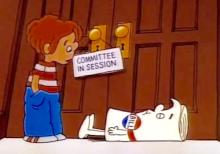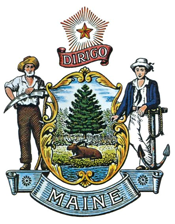
Fast, affordable Internet access for all.

Today in the Maine Legislature, the Committee on Energy, Utilities and Technology voted unanimously to stop LD 1516, a bill that would restrict local telecommunications authority. After Tuesday's compelling testimony, when it was time for a Wednesday vote, LD 1516’s sponsor moved the bill be shelved.
Engaging Testimony
On Tuesday, May 2nd, the Committee of Senators and Representatives met to listen to testimony on the bill. We’ve provided audio of the public hearing.
South Portland, Islesboro, the Sanford Regional Economic Growth Council, and Rockport all sent experts with knowledge about developing public projects to testify in opposition to the bill. Representatives from GWI (the ISP working with several local communities that have invested in their own Internet infrastructure), the Maine Municipal Association, and the Mayors’ Coalition also testified against LD 1516.
Communities where publicly owned fiber is already improving local connectivity provided stories of how they tried unsuccessfully to work with incumbents. Page Classon from Islesboro described how incumbent proposals could be described as, “You pay for it, we own it, we charge you what we charge everyone else.” LD 1516 requires local referendums for such investments and Classon balked at taking such a proposal to the voters.
In South Portland, the city paid for construction of its open access fiber-optic network with general fund reserves. The language in LD 1516 restricts communities to funding through revenue bonds but South Portland uses its network to offer free Wi-Fi and to improve connectivity for municipal facilities. Under LD 1516, they would not have been able to make the investment.
Rick Bates from Rockport testified that the bill would force municipalities to contend with restrictions that legacy providers will never face and how those restrictions will not solve the problem of connecting rural Maine. Bates also took the opportunity to point out that organizations such as the Taxpayer Protection Alliance relies on misinformation and incorrect data, such as their erroneous assertion that Rockport has debt for its FTTH project.

Common themes from each testifying community and the other organizations that opposed the bill were that the bill was “heavy handed” and that it contradicted the state’s strong home rule authority. The proposals in the bill were described as a “regulatory maze” and attempts by out-of-state incumbents to limit competition. Testifiers all pressed the idea that many of the mandates in the bill were matters of common sense and that local communities need the authority to work through the steps at their own pace because each community is unique.
Local Authority?
In an interesting twist, proponents of the bill tried to assert that they supported the bill as a way to preserve local authority. A representative from the Maine Heritage Policy Center, a group with ties to ALEC, tried to describe LD 1516 as a “best practice bill.” Senators and Representatives didn’t seem convinced by proponents' weird logic at the public hearing. They seemed more interested in learning about ways local communities had tackled the problem of poor connectivity.
Seeing The Light
When lawmakers came back on Wednesday, May 3rd for the work session, sponsor Rep. Nathan Wadsworth moved the bill “ought not to pass.” He stated that, since communities were already engaging in feasibility studies as required by the bill and voluntarily taking many of the actions prescribed by LD 1516’s language, the bill was “premature.” With no discussion, the committee passed his motion.
